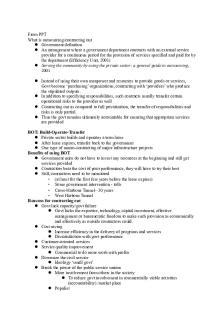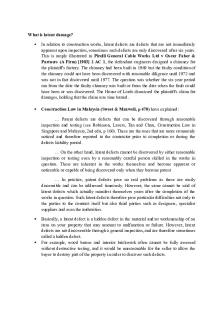What is outsourcing - Lecture notes 3 PDF

| Title | What is outsourcing - Lecture notes 3 |
|---|---|
| Author | Shanshan Wang |
| Course | Hong Kong Politics |
| Institution | The University of Hong Kong |
| Pages | 23 |
| File Size | 1.2 MB |
| File Type | |
| Total Downloads | 79 |
| Total Views | 413 |
Summary
From PPT What is outsourcing/contracting out Government definition An arrangement where a government department contracts with an external service provider for a continuous period for the provision of services specified and paid for by the department (Efficiency Unit, 2001) Serving the communi...
Description
From PPT What is outsourcing/contracting out Government definition An arrangement where a government department contracts with an external service provider for a continuous period for the provision of services specified and paid for by the department (Efficiency Unit, 2001) Serving the community by using the private sector: a general guide to outsourcing, 2001 Instead of using their own manpower and resources to provide goods or services, Govt become ‘purchasing’ organizations, contracting with ‘providers’ who produce the stipulated outputs. In addition to specifying responsibilities, such contracts usually transfer certain operational risks to the provider as well Contracting out as compared to full privatization, the transfer of responsibilities and risks is only partial. Thus the govt remains ultimately accountable for ensuring that appropriate services are provided BOT: Build-Operate-Transfer Private sector builds and operates a term lease After lease expires, transfer back to the government One type of macro-contracting of major infrastructure projects Benefits of using BOT Government units do not have to invest any resources at the beginning and still get services provided Contractors bear the cost of poor performance, they will have to try their best Still, contractors need to be monitored ◦ (at least for the first few years before the lease expires) ◦ Some government intervention - tolls ◦ Cross-Harbour Tunnel– 30 years ◦ West Harbour Tunnel Reasons for contracting out Govt lack capacity/govt failure Govt lacks the expertise, technology, capital investment, effective management or bureaucratic freedom to make such provision as economically and effectively as outside contractors could. Cost saving Increase efficiency in the delivery of programs and services Dissatisfaction with govt performance Customer-oriented services Service quality improvement Commercial to do more work with profits Downsize the civil service Ideology ‘small govt’ Break the power of the public service unions More involvement from others in the society To reduce govt involvement in commercially viable activities (accountability) /market place Populist
Better society by giving ppl greater power through the marketplace while diminishing the power of large public bureaucracies Govt lacks the expertise, technology, capital investment, effective management or bureaucratic freedom to make such provision as economically and effectively as outside contractors could. Cost saving Customer-oriented services Service quality improvement Downsize the civil service Break the power of the public service unions Negative consequences Service failure Decline in public accountability Decline in equity Corruption Economic Costs: ◦ Loss of annual government revenue Social Costs: ◦ Loss of ‘guaranteed’ jobs ◦ Loss of government influence in market outcomes (Public Interest) ◦ Loss of government control over provision of public goods and services Positive consequences To Government: Reduces the operating costs of government Raises proceeds to reduce the debt Reduces future calls on government expenditure Turns losses into tax revenues Reduces lobbying pressures on politicians To the Private Sector: Stimulates development of private enterprises Helps create a competitive environment which in turn increases efficiencies and reduces costs Could provide a basis for an export industry Privatization Criticism Private sector and NGOs are not necessarily more effective and efficient than government agencies (Paul Nelson) Possibilities: service quality not improved; cost increased; old employees be fired and led social problems… Loss of Coverage for social services Can replicate private sector within government (Core of Reinventing Government argument--Osborne and Gabler) Steering rather than Rowing Customer Driven Government
Competition within Government and between units Key is decentralization--not privatization Contracting out in HK Govt role ◦ Belief in the superiority of the market and a non-interventionist approach ◦ Facilitating but not necessarily producing more services, as well as encouraging market competition but not necessarily competing with the market ◦ Hayllar: Outsourcing: Enhancing private sector involvement in public sector services provision in HK, 2005 Viability - Candidates for contracting out o Type of goods o The major driving for of contracting out is value for money (p.631)
. Contracting out as a vehicle for privatization (Prager, 1997)
o Macro-contracting of full-service government operations work best for commercial type enterprises, such as hotels, or telecoms that the government cannot sell outright. But governments cannot conduct macro contracting on activities that are “inherently governmental functions” -
Conditions for successful contracting out from a financial perspective o The sweeping generalization of equating the private sector with efficiency is stretched too far, and therefore, a case-bycase analysis of a balanced presentation of the benefits and drawbacks of both macro- and micro- contracting out is necessary. o o Potential conditions for successful contracting out activities: the awarding, administering and monitoring of contracts, including cost measurement, output specification, contractor regulation, and the management of contractor failure. Long term contract
-
-
- Long-term contracts are heavily used in the traditional public management in which hierarchies are created in the form of bureau in the soft sector and the traditional public enterprises in the business sector. During long-term contracts, the agency expertise, independence, stability, and the rule of law can be better developed. But the effective competition lacks in long-term contracts where there exists massive moral hazards or postcontractual opportunism resulting in X-inefficiencies (the agency runs the slack). To solve this problem, the principal has several mechanisms for better monitoring, such as planning and ex ante control, evaluation and ex post control including both auditing and performance analysis. o The trade-off between production costs and transaction costs when choosing long-term and short-term contracts
o Also need to consider the performance on service quality o The negative political outcome of NPM reforms o The clear-cut separation between politics and administration o The potential responsibility/accountability challenges
https://www.legco.gov.hk/research-publications/english/1617in04government-outsourcing-20170207-e.pdf
brought about concerns on areas such as protection of outsourced workers' rights and benefits, quality of outsourced services delivered and the impact on civil service. In Hong Kong, the Government has an established policy that it should engage the private sector to deliver public services where possible, in keeping with the economic and fiscal objectives of (a)
maintaining a small and efficient government, (b) containing the size of the civil service, and (c) promoting 3 business opportunities and jobs in the private sector. 1. Census and Statistics Department. (2016) 2015 Report on Annual Earnings and Hours Survey. Available from: http://www.censtatd.gov.hk/hkst at/sub/sp210.jsp? productCode=B1050014 [Accessed February 2017].
The Government has all along stated that the primary objectives of outsourcing public services to the private sector are to achieve value for money and to ensure quality service delivery. Nevertheless, having engaged contractors to provide the support services does not necessarily bring about the desired level of quality of services that an outsourcing department intends to have. Therefore, it is important for government departments to put in place an effective performance monitoring mechanism. Impacts on civil servants While government contractors are responsible for delivering services to the community, outsourcing departments remain accountable for the services. In the past, civil service staff unions have expressed the view that holding civil servants accountable for the mistakes made by outsourced staff had adversely affected their morale. Safeguarding benefits for outsourced workers 3.2 In Hong Kong, there have always been concerns that non-skilled workers employed under government contracts are paid unfavourably, particularly under the Tender Procedures for Government Procurement. As a general rule, government departments shall award contracts to those tenderers who comply fully with tender specifications and whose tender prices are the lowest. For contracts where the quality of goods or services to be provided is important and needs to be taken into account in the tender evaluation, separate assessments of the technical and price aspects should be considered to better ensure value for money. In the Outsourcing Survey 2012, it was found that, among the 61 responding departments, 89% of them had examined both the technical and price aspects separately in tender evaluation for all, most or some of their contracts with value above HK$1.43 million. Despite this, about 48 responding departments reported to have awarded at least 80% of their tenders to the lowest price conforming bids. The findings indicate that contract price remained a dominant factor in tender evaluation. n
a bid to encourage service providers to pay higher wages to non-skilled workers, in May 2016, the Government revised the guidelines on the use of marking scheme ("revised guidelines") for government contracts that relied 24 heavily on deployment of non-skilled workers.
19.Legislative Council Secretariat. (2011) Contracting out government services. Background brief submitted to the Panel on Public Service of the Legislative Council. LC Paper No. CB(1)1298/10-11.
Yet, the revised guidelines still recommend a weighting of 30%-40% for the technical factor in tender evaluation and a weighing of 60%-70% for the price factor. See Financial Services and the Treasury Bureau (2016a). 11. Financial Services and the Treasury Bureau. (2016a) Administration's response on issues relating to agenda item IV "Briefing by the Financial Secretary on Hong Kong's latest overall economic situation" raising at the meeting on 6 June 2016 (follow-up paper). Paper submitted to the Panel on Financial Affairs of the Legislative Council. LC Paper No. CB(1)1074/15-16(02).
While the Government has taken action to incentivize service providers to pay higher wages to non-skilled workers, Uplifting contractors' service standards and performance According to the Government, during 2012-2014, there was one case of issuing 38 default notice to a contractor, leading to the award of one demerit point. See GovHK (2015).
This is in contrast to Singapore's Price-Quality Method with a recommended ratio of 30:70 between price and quality, 37.Ministry of Finance, Singapore. (2016) Price-Quality Methods for Tender Evaluations. Available from: http://www.mof.gov.sg/newsreader/articleid/1676/parentId/59/year/2016 [Accessed February 2017].
Contract management is a key stage to ensure that contractual obligations are met. Hong Kong has put in place a Demerit Point System to penalize contractors for breach of contractual obligations. Upon the implementation of the Statutory Minimum Wage ("SMW") on 1 May 2011
https://www.legco.gov.hk/yr10-11/english/panels/ps/papers/ps0221cb1-1298-e.pdf efficiency unit
Administration should use the private sector where possible, in keeping with its economic and fiscal objectives of maintaining a small and efficient government, containing the size of the civil service, and promoting business opportunities and jobs in the private sector. Outsourcing 3. The Administration considers that outsourcing is an effective means of delivering services to the community and can help departments respond to increasing demands for better services of the community, while helping to achieve the cost-savings necessary to meet the Administration’s budgetary and financial objectives. According to the Administration, departments usually outsource for pragmatic reasons, such as acquiring services unavailable in-house, the wish to focus on core services and the need to access skills, rather than for achieving cost savings. In March 2005, the Administration proposed a new standard employment contract for non-skilled workers for use by contractors of government service contracts. Hon WONG Kwok-hing queried whether the staff savings achieved through containing the size of the civil service would be offset by the cost for government outsourcing contracts. he Administration explained that the primary objectives of outsourcing public services to the private sector were to achieve value for money and to ensure quality service delivery. The Administration pointed out that cost cutting was
not a major consideration when departments took forward outsourcing exercises. Value for money is based not only on the minimum purchase price (economy) but also on the maximum efficiency and effectiveness of the purchase.
combination of cost, quality and sustainability to meet customer requirements. wel l wor t ht hemoneys pentoni t .
It would be particularly difficult to derive this information for outsourcing contracts that had been in place for many years and for contracts for which the services outsourced had never been provided in-house. civil service staff unions to express their views 1. the cost-effectiveness of outsourced government services, in particular
the staffing costs incurred in managing outsourcing contracts and rectifying problems if such arose; 2. They also had to spend time on rectifying problems so arising and
monitoring the performance of contractors' staff.
1. Government outsourcing had led to exploitation of non-skilled workers,
and the relevant remedial measures were ineffective; and
Panel members in general were concerned that workers employed under government service contracts, which were normally short-term contracts, were deprived of wage increase and career prospects. They considered that to secure government service contracts, contractors tended to cut staff salaries in order to minimize cost. They criticized EU for aggravating exploitation by promoting government outsourcing. Some Panel members also pointed out that outsourcing had deprived non-skilled workers of the opportunities of working for a stable job and had affected staff morale in the civil service. 18. In response to the views raised by Panel members and civil service staff unions, the Administration advised that – (a) The history of using the private sector to deliver public services could in fact be dated back to the pre-1997 days with the primary objectives of achieving
value for money and ensuring quality service delivery, and not cost cutting or reducing the establishment of the civil service; On the effectiveness of outsourcing, according to the outsourcing surveys, by and large B/Ds considered that they had achieved their objectives in using outsourcing. In fact,the customer feedback received by four major user departments which had outsourced their services showed that improvements had been found in the services outsourced; and https://www.legco.gov.hk/yr10-11/english/panels/ps/papers/ps0221cb1-1280-4-e.pdf
Legislative Council Panel on Public Service Use of Outsourcing in the Delivery of Government Services As with all other options for providing services, care is needed to determine whether outsourcing is appropriate in each particular circumstance. Careful attention must also be given to the design and negotiation of contracts to ensure that these are properly structured to achieve necessary outcomes in terms of service performance, customer service and management of staff. This must be followed up with effective performance measurement and enforcement. Accountability for the service remains with the public service manager. 78% of departments report challenges in monitoring service delivery and compliance. This represents 10% points increase from 68% in 2008. Other major challenges reported by departments include performance evaluation and reporting (69%) and enforcing performance against service levels (65%). Again, both these figures have increased by about 10% points since the last survey. if outsourcing is to achieve beneficial purposes, consistent with public interest, careful attention must be given to the circumstances in which outsourcing is used, the way that contracts are structured and the ongoing oversight and review of performance. Cost effective There has been particular concern that, while reducing cost is not the only objective for outsourcing, the practice may be to seek lowest cost over other considerations. The Government‟ s objective in any contract is achieving value for money for the public. That requires attention to the quality of service to be provided as well as attention to cost. To achieve this end, a „two-envelope‟ approach to tender evaluation is advocated. Sufficient weighting should be given to the technical and quality requirements to ensure that all conforming tenders would meet the technical standards required. These must be assessed before consideration is given to price. Staff response to outsouring
The 2010 Outsourcing Survey finds that only 2% of the departments indicated that they have deleted posts affected by outsourcing in all cases. The majority (85%) of department considered that outsourcing has no or little impact on deletion of posts (Figure 9). If there are staff affected by the outsourcing contracts, the departments concerned would normally redeploy the affected staff, some for contract management, the rest to other duties. 28. It is the government policy that no staff will be made redundant due to contracting out. Although the number of outsourcing contracts increased significantly between 2008 and 2010 the civil service establishment level also increased over the same period. While some staff have been redeployed to work in contract management, others have b een freed up for deployment to other core services. 29. In the Survey, departments were asked to consult their staff on their views to outsourcing. 84% report that their staff accepted the changes brought about from the outsourcing of inhouse service. Only 2% of staff strongly objected to outsourcing of services (2008 survey was 3%).
https://www.legco.gov.hk/yr10-11/english/panels/ps/papers/ps0221cb1-3005-1-e.pdf Follow up the the meeting (21/2 2011)
Legislative Council Panel on Public Service Follow-up to the Meeting on 21 February 2011
Report on2010 Survey on Government Outsourcing December 2010 May 2011
(govt department’s view)
on tendering, there is an increase in use of marking scheme and ‘twoenvelope’ system and 80% of departments awarded over 80% of their tenders to the lowest conforming bids; civil service posts are rarely deleted due to outsourcing and staff generally accepted changes arising fromoutsourcing arrangements; 60% of departments reported that their contract managers were not trained in contract management; fewer departments conduct post-implementation reviews for outsourcing contracts; (contractor’s view)
major concerns in bidding are price being the dominant factor and little room for negotiation;
As at 1 July 2010 there were 5 111 contracts for a total contract value of $210 billion, with a total annualised expenditure of $52 billion. Number of non-works contracts accounts for 78% of the overall number of contracts whilst contract value of works contracts accounts for 61% of the overall contract value.
For works contracts, ARCHSD is the major contributor in both contract value and no. of contracts Same as the 2008 survey, 86% of departments adopted the “twoenvelope” approach in tender evaluation for all, most or some of their contracts.
As with the 2008 sur...
Similar Free PDFs
Popular Institutions
- Tinajero National High School - Annex
- Politeknik Caltex Riau
- Yokohama City University
- SGT University
- University of Al-Qadisiyah
- Divine Word College of Vigan
- Techniek College Rotterdam
- Universidade de Santiago
- Universiti Teknologi MARA Cawangan Johor Kampus Pasir Gudang
- Poltekkes Kemenkes Yogyakarta
- Baguio City National High School
- Colegio san marcos
- preparatoria uno
- Centro de Bachillerato Tecnológico Industrial y de Servicios No. 107
- Dalian Maritime University
- Quang Trung Secondary School
- Colegio Tecnológico en Informática
- Corporación Regional de Educación Superior
- Grupo CEDVA
- Dar Al Uloom University
- Centro de Estudios Preuniversitarios de la Universidad Nacional de Ingeniería
- 上智大学
- Aakash International School, Nuna Majara
- San Felipe Neri Catholic School
- Kang Chiao International School - New Taipei City
- Misamis Occidental National High School
- Institución Educativa Escuela Normal Juan Ladrilleros
- Kolehiyo ng Pantukan
- Batanes State College
- Instituto Continental
- Sekolah Menengah Kejuruan Kesehatan Kaltara (Tarakan)
- Colegio de La Inmaculada Concepcion - Cebu















